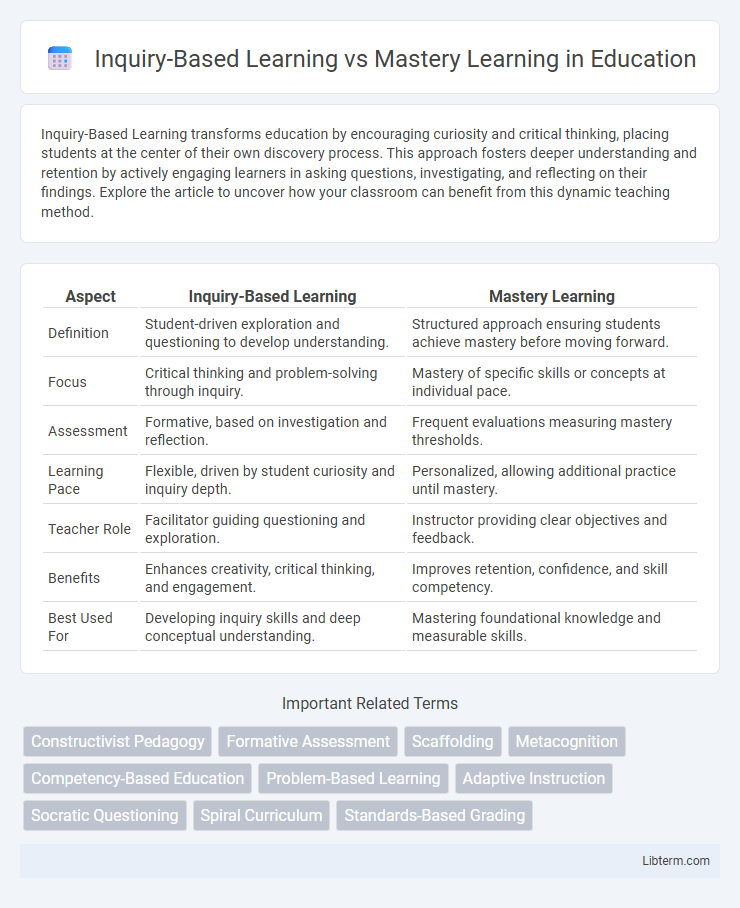Inquiry-Based Learning transforms education by encouraging curiosity and critical thinking, placing students at the center of their own discovery process. This approach fosters deeper understanding and retention by actively engaging learners in asking questions, investigating, and reflecting on their findings. Explore the article to uncover how your classroom can benefit from this dynamic teaching method.
Table of Comparison
| Aspect | Inquiry-Based Learning | Mastery Learning |
|---|---|---|
| Definition | Student-driven exploration and questioning to develop understanding. | Structured approach ensuring students achieve mastery before moving forward. |
| Focus | Critical thinking and problem-solving through inquiry. | Mastery of specific skills or concepts at individual pace. |
| Assessment | Formative, based on investigation and reflection. | Frequent evaluations measuring mastery thresholds. |
| Learning Pace | Flexible, driven by student curiosity and inquiry depth. | Personalized, allowing additional practice until mastery. |
| Teacher Role | Facilitator guiding questioning and exploration. | Instructor providing clear objectives and feedback. |
| Benefits | Enhances creativity, critical thinking, and engagement. | Improves retention, confidence, and skill competency. |
| Best Used For | Developing inquiry skills and deep conceptual understanding. | Mastering foundational knowledge and measurable skills. |
Introduction to Inquiry-Based Learning and Mastery Learning
Inquiry-Based Learning emphasizes active student engagement through questioning, exploration, and investigation to build deep understanding, fostering critical thinking and problem-solving skills. Mastery Learning centers on ensuring students achieve a high level of proficiency in specific topics before advancing, with personalized pacing and continuous assessment guiding progress. Both approaches prioritize student-centered learning but differ in structure: Inquiry-Based Learning promotes discovery, while Mastery Learning focuses on competency and skill mastery.
Core Principles of Inquiry-Based Learning
Inquiry-Based Learning centers on students actively exploring questions, problems, or scenarios to construct their own understanding through investigation and critical thinking. Core principles include fostering curiosity, encouraging student-driven questioning, and promoting hands-on, experiential learning that emphasizes process over rote memorization. This approach develops skills in analysis, synthesis, and evaluation by engaging learners in reflective and collaborative exploration.
Core Principles of Mastery Learning
Mastery Learning emphasizes achieving a high level of understanding before progressing, ensuring students demonstrate proficiency through formative assessments and corrective feedback. Core principles include clear learning objectives, individualized pacing, and continuous assessment to identify and address learning gaps. This approach contrasts with Inquiry-Based Learning by prioritizing structured mastery over exploratory and student-driven investigation.
Key Differences Between Inquiry-Based and Mastery Learning
Inquiry-Based Learning emphasizes student-driven exploration and questioning to develop critical thinking and problem-solving skills, fostering deeper understanding through active inquiry. Mastery Learning focuses on achieving specific learning objectives by allowing students to progress at their own pace until mastering each concept, ensuring thorough comprehension before moving forward. Key differences lie in Inquiry-Based Learning's open-ended, exploratory approach versus Mastery Learning's structured, outcome-focused progression.
Benefits of Inquiry-Based Learning for Students
Inquiry-Based Learning fosters critical thinking and deepens student engagement by encouraging active exploration and questioning. It cultivates problem-solving skills and promotes a personalized learning experience, adapting to individual curiosity and pace. This approach enhances retention and conceptual understanding through hands-on investigation and real-world application.
Advantages of Mastery Learning in the Classroom
Mastery Learning ensures students achieve a high level of understanding before moving on to new concepts, promoting long-term retention and reduced learning gaps. This approach allows personalized pacing, enabling educators to address individual learning needs effectively and increase student confidence. Research shows that Mastery Learning results in higher academic achievement and greater student motivation compared to traditional instructional methods.
Challenges and Limitations of Each Approach
Inquiry-Based Learning often faces challenges such as student frustration due to open-ended problems and inconsistent outcomes stemming from varying student engagement levels. Mastery Learning can be limited by time constraints and the potential for reduced motivation, as students may feel pressured to achieve perfect understanding before progressing. Both approaches require substantial teacher training and resources to effectively address diverse learner needs and maintain instructional quality.
Effective Strategies for Implementing Inquiry-Based Learning
Implementing Inquiry-Based Learning effectively involves fostering student curiosity through open-ended questions and hands-on exploration that encourages critical thinking and problem-solving skills. Teachers should design activities that promote collaboration and reflection, enabling learners to construct knowledge actively rather than passively receiving information. Integrating formative assessments throughout the inquiry process ensures continuous feedback, guiding students toward deeper understanding and mastery of concepts.
Practical Tips for Applying Mastery Learning Techniques
Mastery learning techniques emphasize achieving a high level of competence before moving forward, using formative assessments to identify learning gaps and personalized feedback to guide improvement. Practical tips include breaking content into manageable units, allowing repeated practice opportunities, and setting clear, measurable objectives to ensure mastery of each topic. Incorporating self-paced learning tools and regular progress tracking can enhance student engagement and support effective mastery outcomes.
Choosing the Right Approach: Inquiry-Based vs Mastery Learning
Choosing the right instructional approach between inquiry-based learning and mastery learning depends on educational goals and learner needs. Inquiry-based learning emphasizes critical thinking and problem-solving through exploration, ideal for fostering creativity and deep understanding in subjects like science and humanities. Mastery learning focuses on ensuring students achieve proficiency on each topic before progressing, making it effective in skill-based disciplines where sequential knowledge building is essential.
Inquiry-Based Learning Infographic

 libterm.com
libterm.com